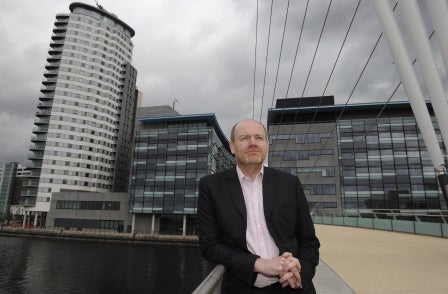
New York Times chief executive Mark Thompson has warned that “legacy publishers” trying to build vast online audiences are making a mistake by trying to compete with Google and Facebook for advertising.
The former BBC director general was speaking to the Media Masters podcast.
The New York Times, he claimed, is reaching an audience of about 125m people a month, with tens of millions considered “deeply engaged”.
Thompson attributes that to the publication “doubling down on seriousness” and “trying to produce quality”.
He said: “The people I worry about are the legacy publishers and some of the new entrants who have decided to go down the middle and tried to be all things to all men and to try and build vast relatively thin audiences with clickbait and with jolly cheerful mainstream news – because there’s an awful lot of that available for nothing on the internet.
“The kind of advertising that goes with that on the internet, you are competing with the likes of Twitter and Facebook and Google for that advertising. Those are tough guys to compete head to head with.
“As it happens we have by far the most successful digital business that I’m aware of in our space compared to our competitors new and old.
“We are going to make half a billion dollars of revenue out of digital this year.
“We have done that not by compromising but by actually doubling down on investigations, great international news coverage, really thoughtful commentary and quality lifestyle and culture coverage as well.”
Thompson said he blames the internet for the “acceleration” of the 24/7 news media culture and cutting “thinking time” for journalists trying to understand a story.
Thompson said that he saw two negatives to the web and social media, alongside its ability to “democratise” knowledge and opinion.
“Everything’s on the internet,” he said.
“The most thoughtful… and wonderful stuff, but the bad and the ugly and the psychotic and the murderous is all there as well.
“Unfortunately some of the spirit of the bad part of social media and of Twitter and of the dark web is filtering back into public life.
“Vitriol and bullying isn’t just restricted to internet trolls, it’s coming into political mainstream.”
Thompson, who helped create the BBC iPlayer, said the rise of satellite and cable television as well as the internet led to the “disruption” of the traditional analogue and print media.
It was a “future” he claimed to have first glimpsed when heading up BBC News coverage of the Tiananmen Square crisis in 1989.
He said the BBC ran between 25 and 30 edited radio and television stories with “somebody cutting something and somebody feeding something” 24-hours a day to cover the crisis.
“I remember thinking very clearly, and again in the First Gulf War a couple of years later, this is what the future looks like,” he said.
“You’ve got this practical problem.
“You’ve got a journalist, do you want them to go out and find out what’s going on or do you want them to stand in front of a microphone and a camera to say what’s going on?
“How do you square that circle? How do you go on doing journalism? How do you go on having thinking time trying to understand what a story is and actually then presenting that story.
“It’s the acceleration affect of the 24/7 news cycle and what it does to media and what it does to stories,” he added.
“Media organisations came under immense competitive pressure and that’s when the temptation to try and find the strongest opinion, the shortest most punchy headline, the thing that’s going to work well on Twitter, that’s when that comes to the fore and so you get this kind of intensification and acceleration of the news.”
Thompson said his best day as BBC director general was when news correspondent Alan Johnson, who had been captured in Gaza, was finally released.
And that his worst was the government’s proposal to stop funding free licence fees for over 75s in 2010, which had prompted him to write his resignation before being called back for further talks that later saw the plan shelved.
Email pged@pressgazette.co.uk to point out mistakes, provide story tips or send in a letter for publication on our "Letters Page" blog
